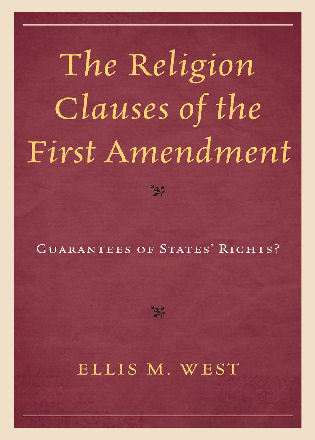The Religion Clauses of the First Amendment: Guarantees of States’ Rights

The Religion Clauses of the First Amendment: Guarantees of States’ Rights?
Ellis M. West
Lexington Books 2011
The First Amendment of the U. S. Constitution begins: “Congress shall make no law respecting an establishment of religion, or prohibiting the free exercise thereof . . . .” The Supreme Court has consistently held that these words, usually called the “religion clauses,” were meant to prohibit laws that violate religious freedom or equality. In recent years, however, a growing number of constitutional law and history scholars have contended that the religion clauses were not intended to protect religious freedom, but to reserve the states’ rights to legislate on. If the states’ rights interpretation of the religion clauses were correct and came to be accepted by the Supreme Court, it could profoundly affect the way the Court decides church-state cases involving state laws. It would allow the states to legislate on religion-even to violate religious freedom, discriminate on the basis of religion, or to establish a particular religion.
This book carefully, thoroughly, and critically examines all the arguments for such an interpretation and, more importantly, all the available historical evidence. It concludes that the clauses were meant to protect religious freedom and equality of the individuals not the states’ rights.
Reviews
“This book addresses the question whether the two religion clauses, Establishment and Free Exercise, should be understood as merely ‘jurisdictional,’ that is, as merely precluding Congressional action over religion without conveying any substantive understanding of religious freedom. West has done a thorough job of examining the evidence and demonstrating that the ‘jurisdictional’ interpretation of the religion clauses fails, regardless of what one thinks about using the due process clause of the Fourteenth Amendment to apply the Establishment Clause against the states.” — Murray Dry, Charles A. Dana, Professor of Political Science, Middlebury College
Highly recommended. Graduate, research, and professional collections. — M. W. Bowers, University of Nevada, Las Vegas
Reviewed in September 2012 issue of CHOICE: West tackles the issue of whether the free exercise and establishment clauses of the First Amendment to the US Constitution have any real meaning or whether they merely leave to the states, as opposed to the federal government, the authority to regulate religious activity (i.e., the jurisdictional interpretation). That this seems even in doubt is odd to those who have studied the clauses and the jurisprudence around them. Nonetheless, the author takes on the logic for the jurisdictional interpretation, as opposed to the substantive interpretation of the religion clauses, and examines the historical evidence, including the views of the Federalist and anti-Federalist, presented by its defenders. Ultimately he concludes that there is very little historical evidence to support the jurisdictional interpretation. Highly recommended for scholars and advanced students of public law.
Ellis M. West is emeritus professor of political science at the University of Richmond.